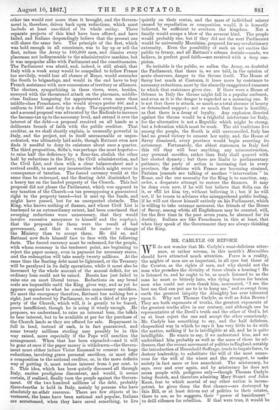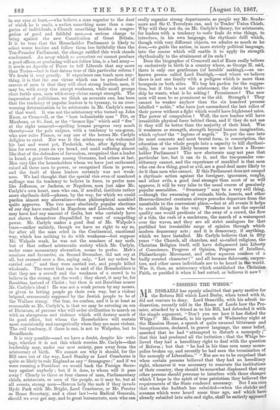MR. CARLYLE ON REFORM.
vrdo not wonder that Mr. Carlyle's semi-delirious utter- ance, or rather scream, in this month's Macmillan should have attracted much attention. Force is a reality, the mights of men are as important, in all eyes but those of the Creator, as the rights of men, and why should not the man who preaches the divinity of force obtain a hearing ? He is listened to, and he ought to be, as much listened to as the man he must so bitterly hate, who dying beaten for beaten men who could not even thank him, murmured, "I see the best use God can put me to is to hang me," and so swept from earth the greatest iniquity the Almighty has ever tolerated upon it. Why not Thomas Carlyle, as well as John Brown ? They are both exponents of truths, the greatest exponents of the greatest truths alive in our century, and although one be representative of the Devil's truth and the other of God's, let us at least reject the one and accept the other consciously. Mr. Carlyle has something to say, and the half delirious, rhapsodical way in which he says it has very little to do with the matter, nothing if he is intelligible at all, and he is quite intelligible. 'He wants to say, if we understand him, and we understand him probably as well as the mass of those he ad- dresses, that the recent movement of politics in England, notably the introduction of Household Suffrage, tends to impair force, to destroy leadership, to substitute the 'will of the most nume- rous for the will of the wisest and the strongest, to make society in fact more or less anarchical. The aristocracy, he says, over and over again, and by aristocracy he does not mean people with pedigrees only—though Thomas Carlyle being Scotch, and therefore admiring Mary Stuart and John Knox, feat to which mortal of any other nation is incom- petent, he gives them the first chance—are destroyed by this Bill, or at least driven out of politics to their estates, there to use, as he suggests, their " power of banishment " to drill riflemen for rebellion. If that were true, it would be in our eyes at least,—who believe a man superior to the dust of which he is made, a nation something more than a con- geries of individuals, a Church something besides a congre- gation of good and faithful men,—a serious charge to bring against the new Constitution of Great Britain. If it be true that the Householder Parliament is likely to select worse leaders and follow them less faithfully than the Ten-Pounder Parliament, the change ratified this week stands condemned. An army which ex necessitate rei cannot produce a good officer, or producing will not follow him, is a bad army— it needs no Apostle of Force to tell Liberals that any more than Tories—but is that datum true of this particular reform ? We doubt it very greatly. If experience can teach men any- thing, it is that the one virtue which can be predicated of masses of men is that they will elect strong leaders, men, it may be, with every vice except weakness, while small groups elect feeble men, men with every virtue except strength. The impression of politicians, we think an accurate one, has been that the tendency of popular leaders is to tyranny, to an over- weening determination to be aristocrats in Mr. Carlyle's sense of that word. It was not the aristocracy who turned up John Knox, or Cromwell, or the "lean indomitable man " Pitt, or Mirabeau, or St. Just, or the "bronze lips" which said " fire " at the right moment—spoiling human progress very much thereby—or the pale enigma, with a tendency to sea-green, who now rules France, or any one of the heroes Mr. Carlyle delights to extol. Nor was it the aristocracy who welcomed his last and worst pet, Frederick, who, after fighting for him for seven years on rye bread, and amid suffering almost like that of the defenders of Jerusalem, recognized that a leader in Israel, a great German among Germans, had arisen at last. Men very like the householders whom we have just enthroned raised all these men to power, or recognized them in power, and the fault of those leaders certainly was not weak- ness. We had thought that the special vice even of manhood suffrage was its tendency to believe in force, to prefer men like Jefferson, or Jackson, or Napoleon, men just after Mr. Carlyle's own heart, men who can, if needful, institute rather more rhythmic drill—phrase, by the way, for which we could pardon almost any aberration—than philosophical mankind quite approves. The two most absolutely popular elections of our day have resulted in Napoleon and Lincoln, men who may have had any amount of faults, but who certainly have not shown themselves disqualified by want of compelling power. Mr. Carlyle makes a good deal of Mr. Walpole's tears—rather unfairly, though we have no right to say so, for after all the man cried in the Continental, emotional way, which has nothing to do with weakness—but suppose Mr. Walpole weak, he was not the nominee of any mob, but of that refined aristocratic society which Mr. Carlyle, under some momentary aberration, seems to prefer. Mob's nominee and favourite, on Second December, did not cry at all, but crooned over a fire, saying only, " Let my orders be carried out ;" and they were carried out, and people killed wholesale. The worst that can be said of the Householders is that they are a crowcP, and the weakness of a crowd is to believe in the strong, not the weak ; they shout, it maybe, for Barabbas, instead of Christ ; but then is not Barabbas nearer Mr. Carlyle's ideal ? He was not a weak person by any means, or given to letting people go their own way, but a violent brigand, erroneously supposed by the Jewish people to be of the Wallace stamp. Our fear, we confess, and it is at least as reasonable as Mr. Carlyle's, is that we may be entering an era of Dictators, of persons who will order civilization to march on with an abruptness and violence which will destroy much of its good effect, but whom the Householders will sustain most consistently and energetically when they are most violent. The evil tendency, if there is one, is not to Walpoles, but to Broadheads.
It is very possible—and we have a doubt, despite his writ- ings, whether it is not this which worries Mr. Carlyle—that leadership may, under our new society, pass away from the aristocracy of birth. We cannot see why it should, for the Bill once out of the way, Lord Stanley or Lord Cranborne is quite as likely to rule England as any " demagogue ;" and if we were running a President we would back the Foreign Secre- tary against anybody ; but if it does, to whom will it pass away ? Clearly to three or four classes of men, Parliamentary chiefs, aristocrats, or men of the people, as it may be, but at all events, strong men—Heaven help the mob if they invade Hyde Park with Mr. Bright, Lord Cranborne, or Mr. Forster as Home Secretary, and a clear law I—to Radical Generals, should we ever get any, and fe great bureaucrats, men who can really organize strong departments, as people say Mr. Scuda- more and Sir 0. Trevelyan can, and to Trades' Union Chiefs. Why will they not do, on Mr. Carlyle's theory, for aristocrats, for leaders with a tendency to make fools do wise things, to introduce, in his own language, the rhythmic drill which, though with very different objects, we admire as much as he• does,—to guide the nation, in more strictly political language, into the course which will enable it to apply its strength rhythmically to the attainment of its ends ?
Does the biographer of Cromwell and of Knox really believe so exclusively in birth in a country where, as George H. said, there is only one gentleman (of heralds' making),—an un- known person called Lord Denbigh,—and where we believe- there is not one family with a pedigree which is more than bourgeois on both sides. We beg his pardon for the sugges- tion, but if this is not the aristocracy, the claim to leader- ship he wants, what is he asking ? Prominence ? The new men will soon be as prominent as the old. Strength ? They cannot be weaker anyhow than the six hundred persons labelled " noble," who have just surrendered the last relics of their power without a fight which would have frightened mice. The power of compulsion ? Well, the new leaders will have irresistible physical force behind them, and if they do not use it they will be better than the majority of their kind. Was. it weakness or strength, strength beyond human imagination, which refused the " legions of angels." To put the case into, its most concrete and most brutal form, is conscription, the- education of the whole people into a capacity to kill rhythmi- cally, less or more likely because we are to have a House- holder Parliament ? The new electorate may not pass that• particular law, but it can do it, and the ten-pounder con- stituency cannot, and the experience of mankind is that men who can do a thing, good or evil, are a good deal more likely to- do it than men who cannot. If this Parliament does not compel a rhythmic action against the foreigner, ignorance, roughs, and other evils, a good deal stronger than most of us will approve, it will be very false to the usual course of genuinely popular assemblies. " Swarmery " may be a very evil thing, —though the swarming of animals, birds, insects, and other Heaven-directed creatures always precedes departure from the- unsuitable to the convenient place,—but at all events it helps- to crush things in the way. Weakness is not the especial quality one would predicate of the sway of a crowd, the flow of a tide, the rush of a sandstorm, the march of a waterspout over the waves, and they are all strict analogues for that purblind but irresistible surge of opinion through which modern democracy acts ; and it is democracy, if anything, which we have installed. Mr. Carlyle believes that in fifty years "the Church, all churches, and so-called religions, the- Christian Religion itself, will have deliquesced into Liberty of Conscience, Progress of Opinion, Progress of Intellect, Philanthropic Movement, and other aqueous resolves of a badly scented character " and all because fishermen, carpen- ters, and other mean individuals are to be heard in the world. Was it, then, an aristocracy which established the Christian, Faith, or purified it when it had rotted, or believes it now ?































 Previous page
Previous page